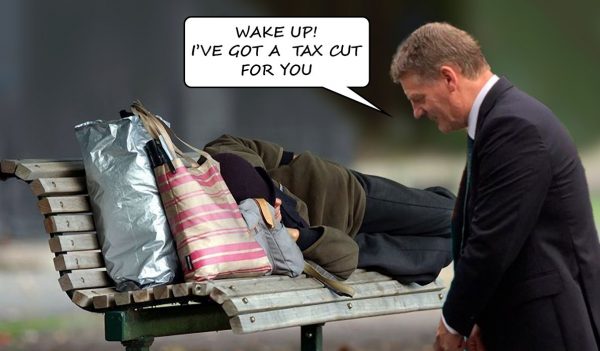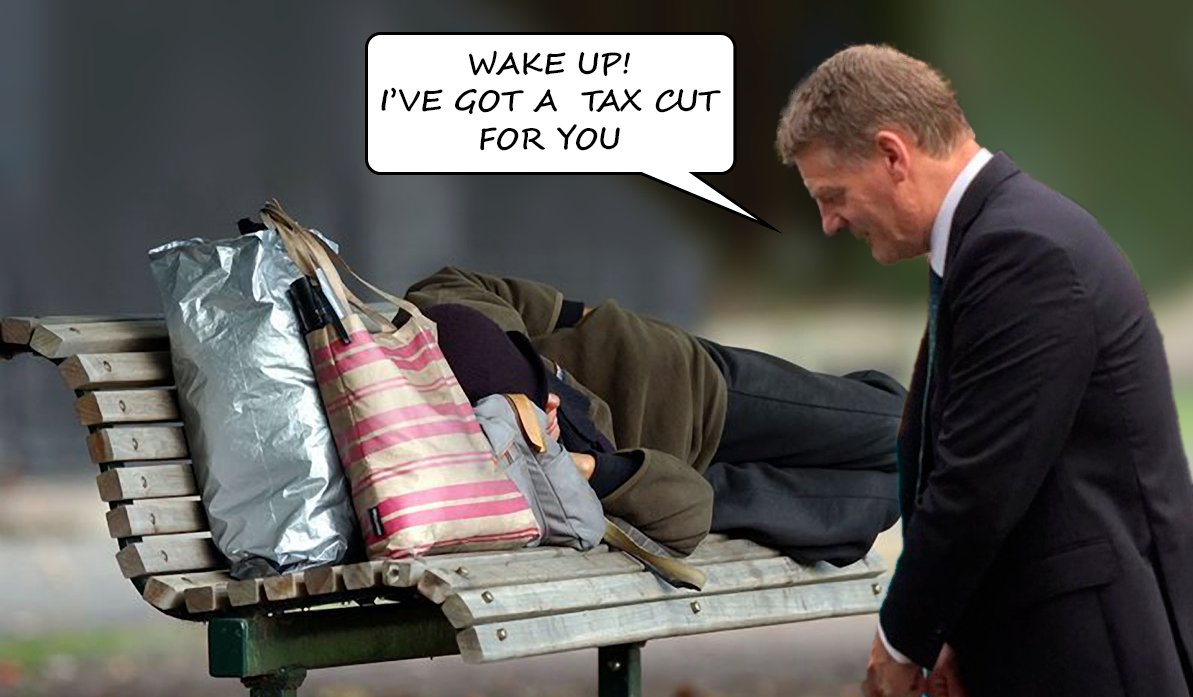
The super debate hasn’t been super. It has missed the most important issues. The government has tried to focus on misleading measures of financial affordability in 2040, in an attempt to position themselves as responsible. But the real issues are about fairness and equity, across and within generations.
New Zealand’s superannuation scheme, universal and indexed to the average wage, has been world leading. Poverty amongst older citizens has been virtually eliminated. NZ Super has become a vital safety net. Around 40 per cent of pensioners rely solely on NZ Super for their retirement income, and for a further 20 per cent, NZ Super makes up 80 per cent of their income.
But this social protection is eroding rapidly. Future generations will face a far more difficult future. The main game changer has been housing. A house now costs around five times salary compared to two-and-a-half times during the 1990s, and home ownership rates have plummeted. While it is still high for senior citizens, increasing numbers of senior citizens are struggling with rising housing costs, as well as bearing the brunt of under-funding of the heath system.
House price speculation has been driven by a tax system that currently loads the tax burden onto wage and salary earners, and gives tax breaks to landlords. Property owners are able to borrow high levels of debt, get a tax free deduction of the interest payments, and pocket the tax free profit on the sale of the property. This skews the system to favour the wealthy and make it impossible for most young people to buy their own home.
The tax system worsens inequality. Over the past two decades, most of the economic benefits have gone to a small proportion of the population, and inequality in New Zealand has widened sharply. The Green Party will introduce a Capital Gains Tax to make the tax system fairer and reduce the burden on lower income earners.
The current system is also unfair across generations. Raising the age of entitlement to Super continues the irresponsible approach of the Baby Boomer generation who have loaded the costs of education onto younger people and charged them interest on student loans. They/we have priced housing out of the reach of most young people and left huge debts for climate change and ecological damage. Younger generations will find it more difficult to accumulate savings and will be less likely to own their own home. Now the government proposes that they will have to work longer until retirement. It is unjust.
The higher age will also further delay retirement for manual workers, many of whom have had a lifetime of physical labour, as well as Māori, who have a lower life expectancy. Many other older people are willing and able to work for longer. A more flexible system is needed, not just pushing out the age from 65 to 67 years old.
Whether or not NZ Super is affordable is a question of priorities. It is not affordable if the government cuts tax on higher income earners, as they did in 2010. This government has already started talking up another round of tax cuts. NZ Super was more affordable in 1982-86 when the top tax rate was 66%. That meant that two thirds of the NZ Super came back to the government. But now the top tax rate is 33%, more of the benefit is going to those who need it the least.
We need a vision for superannuation in the future. For example, it is likely that there will be more automation and fewer jobs, and serious disruption as a result of climate change. Many more people may be entering retirement with few savings and no job prospects in the later years.
We can afford to maintain the age of eligibility at 65 years old, if we make the right choices. We need to change the policies that have driven inequality over the past two decades. Instead of weakening old age support, the Green Party would like the superannuation system to become a foundation for building stronger social protection across society and extending universal benefits.
Barry Coates MP is Green Party spokesperson on Senior Citizens, Commerce and Consumers Affairs, Trade and Investment, Arts and Culture and Gambling. He is a list MP based in Auckland.





1 ) House price speculation has been driven by a tax system that currently loads the tax burden onto wage and salary earners, and gives tax breaks to landlords.
2 ) The tax system worsens inequality. Over the past two decades, most of the economic benefits have gone to a small proportion of the population, and inequality in New Zealand has widened sharply.
3 ) The current system is also unfair across generations.
4 ) The higher age will also further delay retirement for manual workers, many of whom have had a lifetime of physical labour, as well as Māori, who have a lower life expectancy.
———————————————————————————
Four GOOD reasons right there to vote this viscous National govt out this coming September general election.
Enough is enough.
your right on the button Barry
Only because the semi-educated baby-boomers voted for lower taxes, as every self-centered generation has done since then. No generation is any different.
Muldoon (National Govt) promised that our current super scheme would last forever, funded out of taxation. That was an irrevocable promise for us oldies. I voted against it to retain the self-funding scheme that Labour had brought in. But Muldoon won.
Later on neo-liberals lowered all tax rates, then claimed it was totally false that super should be funded out of tax. Why? Because they had lowered rates of taxation, not because Muldoon had been dishonest.
The social contract has been broken by myopic neo-liberals. Restore higher tax rates for the rich, properly fund social services via the state (including superannuation), make education free again, stop funneling money into landlords instead of state housing, and make accommodation affordable again…
Why do i feel I am pissing into the wind?
I agree Barry!
“irresponsible approach of the Baby Boomer generation who have loaded the costs of education onto younger people and charged them interest on student loans.”
Are you usually so cavalier with the truth, sir? So loose with the generalisations? So quick with the manufactured memes?
If so – may I suggest a future career in propaganda and problem-making? The world needs more disunity and problems – doesn’t it?
PS – it is rumoured that the GenX and Y cohort outnumber the evil, rapacious, everyone with a degree and a bulging portfolio Baby Boomers. And – they’re all alive at the same time. And those generations call the Boomers ‘Mum and Dad’ or even ‘Grandparents’.
Allow a thought to form: they are ALL alive at the same time – and very few have been law/policy makers in the public arena.
Read your own words: “Around 40 per cent of pensioners rely solely on NZ Super for their retirement income, and for a further 20 per cent, NZ Super makes up 80 per cent of their income.” Those rich as retirees.
If possible – please stop kicking the victims of stupid policy decisions made by a bunch of reckless idealists, and clean up the mess.
It has to be you and your colleagues because… most of us aren’t in Parliament, and you don’t listen to us, anyway.
As long as we have this obsession with residential real estate, a quarter acre section home, and with people using property investment for retirement income, nothing much will improve:
http://www.nzherald.co.nz/personal-finance/news/article.cfm?c_id=12&objectid=11651660
“Nominally, mortgage debt is at an unprecedented high of $217.5 billion. Combined with consumer debt it takes total household debt to $232 billion – almost half of New Zealand’s total debt mountain. The rest is comprised of $91.34 billion in business debt, $59.42 billion in agricultural debt and Government debt at about $110 billion.”
https://pro.newsroom.co.nz/articles/1308-hive-news-friday-mortgage-debt-up-nz-2-1-bln-in-may-auckland-consent-trend-falling
And while even the IMF recommends a CGT, that alone will NOT solve much at all:
http://www.nzherald.co.nz/business/news/article.cfm?c_id=3&objectid=11813569
We are at present heading to a new financial crisis, as the last one is far from having been dealt with. While interest rates may increase in the US, a fair few other economies are headed into a different direction, where they simply cannot “grow” out of the doldrums.
The system will somehow collapse, sooner or later, and whatever the banks may do, it will be a bandaid and nothing more, leaving many in suffering.
We need a massive turnaround, a substantial investment program in state and social housing that is truly affordable to renters. The milking of tenants by the many private landlords must stop, they only have an interest in maintaining the status quo, and will do all to put pressure on any government, to do nothing more than a few tweaks.
Even the Greens are too scared to go that way, I note, as we need to put restrictions and taxes on private property ownership and land, and empower people to become either just single home owners or renters of affordable homes, owned by the state, or by agencies that have to follow a code of social and economic conduct.
Productive investment must be encouraged also, not in ever more private property speculation and buying and selling, but in real production of goods and services.
The Australian and other banks must also be held to account, so the daylight robbery of the working population needing housing stops.
I see NO party that is presently in Parliament, that has the guts to do what is needed.
We are fast becoming a nation of tenant and work slaves, who serve only the interest of a minority who hold the bulk of all property and wealth. Sadly too many are lone survival fighters, rather busy fighting each other, than stand together, than act smartly and resolutely, and to stop this madness.
It is New Zealand First policy, as in actually on party fliers and on the party website description of its housing policy, to not allow the sale of property to non New Zealanders.
You can go here to see this:
http://www.nzfirst.org.nz/housing
That may well be so, Robert, what about the remaining issues I raised, and what solutions has NZ First for those?
Yes Robert but who can trust Peters given his past record?
“We need a vision for superannuation in the future. For example, it is likely that there will be more automation and fewer jobs, and serious disruption as a result of climate change. Many more people may be entering retirement with few savings and no job prospects in the later years.”
Sadly NACTIONAL don’t think for the future, only an election cycle but you are so correct Barry and thanks for the thoughtful blog.
Winston said it right yesterday on his weekly messages, and you would agree with his criticism of fudging the figures.
:Rt Hon Winston Peters
Leader of New Zealand First
Member of Parliament for Northland
Leader’s message
The prime minister has been crowing about having a supposed operating surplus of $1.14 billion for the last seven months to January despite that surplus being fictional.
As the government was making the boast Lawrence Yule, Local Government New Zealand chairman, said there was an urgent need for $1.4 billion to build tourism infrastructure.
New Zealand First has a list of names for his supposed ‘surplus’.
We would call it a ‘bogus surplus’, a ‘spurious surplus’, a ‘fictional surplus,’ a ‘pull the wool over their eyes’ surplus.
And predicting surpluses can be pointless. History has shown the government gets things wrong as was the case when Labour Finance Minister David Caygill forecast an $89 million surplus for 1990/91 and it was later found to be a $3.2 billion deficit.
There’s no substance to Mr English’s ballyhooed surplus.
You cannot have a legitimate surplus that relies, as the government’s does, on consumerism driven by mass population growth through immigration.
How can you have a surplus when you make massive cuts elsewhere and everywhere?
It’s easy to conjure up a bogus surplus if you have frozen the police budget since 2009 and taken a slasher to other sectors.
National have slashed funding ($1.7 billion) to district health boards; to industry training ($15 billion) and to DoC ($424 million), just to name a few.
At the same time they have allowed housing to run down to the point there is a chronic shortage of over 40,000 houses.
Regions are crying out for funding to build roads but are having to wait. All the government can give them are promises.
Look at Northland with the promises 10 bridges would be built and nothing has happened and what about the promises National have made for defence force spending worth billions of dollars?
All National does is shuffle the figures around, cut this, cut that and they trumpet about a surplus.
Bill English is talking of tax cuts but with a general election coming up it’s all just puffed up rhetoric.
With an election approaching it looks and sounds good but they under-estimate the intelligence of New Zealanders.
The true state of our society can be seen all around us and that tells a different story to Bill English’s surplus ‘spin.’
The real situation is one of overcrowding – stress – pressure – largely stagnant incomes, a housing crisis and increasing levels of homelessness and child poverty, all of which are not helped by rampant immigration.
Rt Hon Winston Peters
Leader of New Zealand First
Member of Parliament for Northland
Comments are closed.